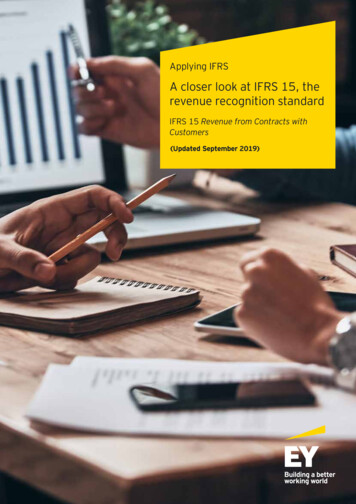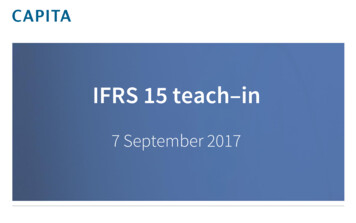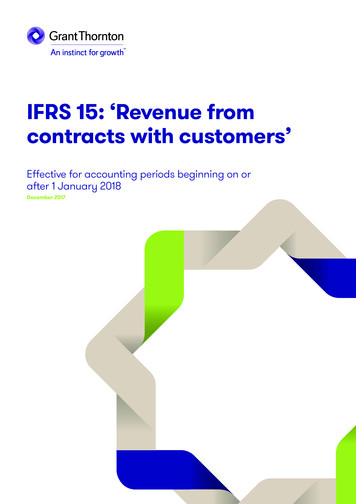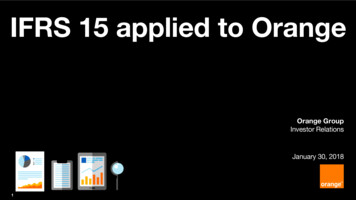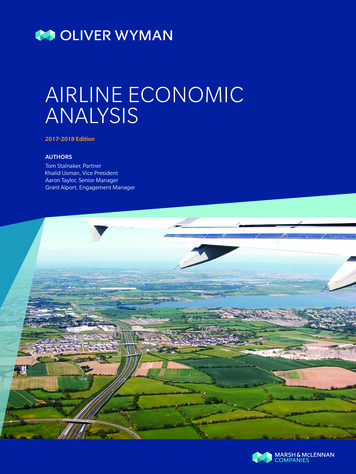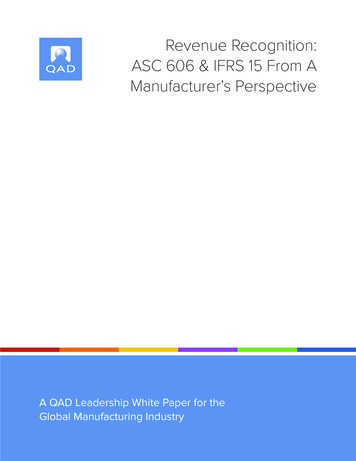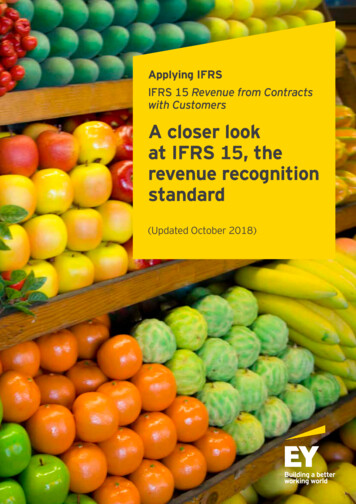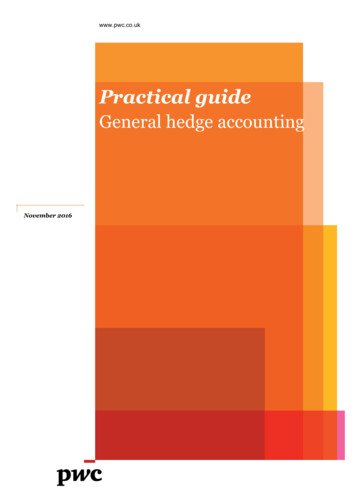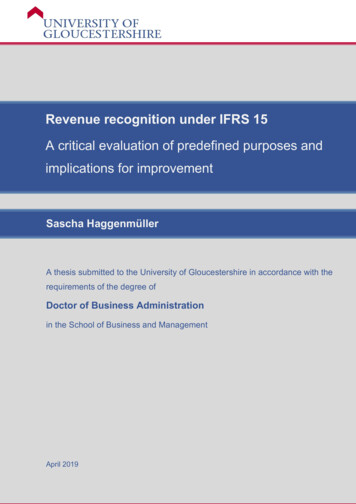
Transcription
Revenue recognition under IFRS 15A critical evaluation of predefined purposes andimplications for improvementSascha HaggenmüllerA thesis submitted to the University of Gloucestershire in accordance with therequirements of the degree ofDoctor of Business Administrationin the School of Business and ManagementApril 20190
AbstractThis study investigates problems and major challenges that may arise during theimplementation of IFRS 15 and assesses the likely impact on firms’ profitability andperformance. Scientific discussions on IFRS 15 are far from reaching an in-depthunderstanding of the implementation issues and various interpretations of the newstandard as previous research projects were conducted at a point in time that onlyallowed a preliminary and superficial assessment as companies were not yet preparedto implement the new standard. This study aims to provide a significantly deeper levelof detail and profound insights as it was conducted during the time that IFRS 15became effective.The author applies a qualitative approach. Based on a constructivist paradigm,qualitative data is gathered through 15 semi-structured in-depth interviews in Germanywith auditors, mainly certified public accountants with outstanding experience in IFRS15, and accountants involved or in charge of the implementation of IFRS 15 in theircompanies. The interview guide was developed based on the implications from otheraccounting studies, theoretical concepts and knowledge gaps identified in theliterature review. A qualitative analysis of the 2017 annual reports of the German DAX30 companies is conducted to triangulate the results related to the likely impact onfirms’ profitability and performance.The results of the study indicate that IFRS 15 is mainly addressing specific industries,which had difficulties in applying previous IFRS revenue recognition requirements dueto missing or unspecific guidance forcing them to use standards outside of IFRS. Dueto its complexity, however, IFRS 15 also affects companies with simple businessmodels and its implementation may be unexpectedly time-consuming, work-intensiveand difficult without leading to material changes. Although no indication is detectedthat earnings management or manipulation may be related to the adoption of IFRS 15,the standard still requires interpretation and professional judgment that may be subjectto erroneous or divergent accounting for transactions. Although IFRS 15 appears tobe necessary, it is anticipated that it rather represents a complex combination ofvarious existing standards and consequently fails to help the profession. Therefore,the predefined purposes of IFRS 15 formulated by the IASB are, at minimum,questionable from a practical viewpoint.1
Author’s DeclarationI hereby declare that this dissertation entitled “Revenue recognition under IFRS 15 –A critical evaluation of predefined purposes and implications for improvement”,submitted to the University of Gloucestershire in accordance with the requirements ofthe degree of Doctor of Business Administration in the School of Business andManagement, is my own original work and, to the best of my knowledge and belief,contains no material previously published except where acknowledgement is made.I certify that the substance of this dissertation has not, either in whole or in part, alreadybeen or is not currently being submitted for any other degree at this or any otheruniversity.I certify that any help received in preparing this dissertation and all sources used havebeen acknowledged.Signature of Candidate:Sascha HaggenmüllerMaster of Arts (M.A.)Munich, GermanyApril 20192
DisclaimerNote of LiabilityThe information in this dissertation is distributed on an ‘as-is’ basis without warranty.While every precaution has been taken in its preparation, neither the author nor theUniversity of Gloucestershire shall have any liability to any person or entity withrespect to liability, loss, or damage caused or alleged to be caused directly or indirectlyby the information described herein.3
AcknowledgementsAt first, it is most important to note that this research project would not have beencompleted without the support and expertise of various people. Due to anonymityreasons, I cannot individually acknowledge each auditor or accountant whose insightsformed the basis for the research findings and also improved the structure and contentof the interview guide in the course of pilot interviews. These people gave their time,expertise and energy during their participation in the data collection interview. Pleaseaccept my sincerest thanks for your valuable contributions.On an individual basis, I owe an enormous debt of gratitude to my first supervisor, DrKerry Sullivan. At an early stage of this research project, Kerry guided me along thedifficult path of research, rather as a sparring partner than a micro-managingsupervisor ensuring a great degree of freedom and creativity. Secondly, I want to saythank you to my second supervisor, Dr Doaa Aly. Joining the research project at alater stage in fall 2016, she was guiding me through the RD1 process and helping mealong as major questions arose in the course of the project. Their profoundexperience, insights and knowledge, combined with accessibility, short noticefeedbacks and also a good sense of humor, made the journey rewarding andunforgettable.To the DBA staff: Ms Charley Sercombe, Ms Daniela Sommer, Dr Philippa Ward, DrRobin Bown and Prof Dr Volker Wittberg, I sincerely thank you for your assistancereceived over the course of this research.To the other students of Cologne Cohort 5: You became real friends in the past fewyears and made this journey unforgettable. Our great weekends in Cologne, learningmeetings all over Germany and in Cheltenham gave me valuable insights to developmy research project.Finally, I would like to thank my partner Nicole Saleh, who moved from the UnitedStates to Germany so that we could live together, and my parents, Andrea and HansHaggenmüller. The love, support and patience of these people mean everything tome and such a project would not be possible without their backing. Therefore, Idedicate this dissertation to them.4
Table of ContentsAbstract. 1Author’s Declaration . 2Disclaimer . 3Acknowledgements . 4List of Abbreviations . 11List of tables . 141.2.Introduction . 201.1Background and rationale . 201.2Research aim and questions . 221.3Method of study . 251.4Constraints and limitations . 261.5Structure of the thesis . 271.6Remarks on vocabulary . 281.7Conclusion . 29IFRS: History, background, and revenue recognition requirements . 302.1History and background of IFRS . 302.1.1Terminology . 302.1.2History and implementation of IFRS . 312.1.3IFRS development process . 342.2Previous revenue recognition requirements under IFRS . 352.2.1The amount of revenues . 352.2.2Timing of revenue recognition . 362.2.3IAS 11 – Construction Contracts . 362.2.4IAS 18 – Revenue. 382.2.5Related interpretations. 392.3New revenue recognition requirements under IFRS . 412.3.1History of IFRS 15 . 412.3.2Scope of IFRS 15 . 422.3.3Concept of IFRS 15 – The five-step model and disclosures. 422.3.3.1Identification of the contract(s) with the customer . 442.3.3.2Identification of the performance obligations in the contract . 452.3.3.3Determination of the transaction price . 455
2.43.2.3.3.5Revenue recognition when (or as) the entity satisfies a performance obligation . 472.3.3.6Disclosures . 47Conclusion . 483.1Previous IAS on revenue recognition . 513.2Revenue recognition under IFRS 15 . 543.2.1Importance and relevance of IFRS 15 . 553.2.2IFRS 15 readiness . 563.2.3Potential effects of IFRS 15 . 583.2.4IFRS 15 implementation . 61Adoption and implementation of IFRS . 633.3.1Push towards accounting harmonization . 633.3.2Effect on quality as well as profitability and performance . 653.3.3Implementation of IFRS . 673.4Interpretation and judgment within IFRS . 703.4.1Principles-based standards and professional judgment . 713.4.2Language and probability and uncertainty expressions. 733.5Manipulative actions in IFRS . 763.5.1Motivation and incentives for earnings management . 763.5.2Earnings management techniques . 783.5.3Earnings management in the context of IFRS . 803.6Knowledge gap and research questions . 823.6.1Perceptions regarding the implementation of IFRS 15 . 823.6.2Different potential interpretations and manipulation in IFRS 15 . 843.6.3The likely impact of IFRS 15 on firms’ profitability and performance . 873.7Conclusion . 88Theoretical framework. 904.1Institutional theory . 904.1.1Conception of DiMaggio and Powell . 914.1.2Previous studies on institutional theory . 924.2Discussion . 954.2.1Critical assessment of further theoretical concepts . 964.2.2Justification of institutional theory as the theoretical lens . 974.35.Allocation of the transaction price to the performance obligations. 46Literature review . 513.34.2.3.3.4Conclusion . 98Research methodology and design . 1005.1Philosophical foundations and contextualization . 1006
5.1.1The ontological question . 1005.1.2The epistemological question . 1015.1.3The methodological question . 1025.1.4Research paradigms. 1025.1.5Discussion of research paradigms in accounting . 1035.2Research approach and design . 1045.2.1Paradigm . 1045.2.2Research methodology . 1065.2.2.1Quantitative approach . 1065.2.2.2Qualitative approach . 1075.2.2.3Mixed methods . 1075.2.2.4Discussion and justification of the constructivist approach . 1085.2.35.2.3.1Interview types . 1095.2.3.2Discussion and justification of semi-structured interviews for the research . 1115.2.3.3Supplementary document analysis . 1125.2.4Sample size . 1135.2.4.2Sampling technique . 1155.2.4.3Data collection process . 1215.2.4.3.1Pilot study . 1225.2.4.3.2Development of interview guide . 1225.2.4.3.3Scaling . 1415.2.4.3.4Interview process . 1425.2.4.3.5Transcribing and translating data . 1445.2.4.3.6Selection of documents for triangulation purposes . 144Data analysis . 1455.2.5.1Data analysis process . 1455.2.5.2Content analysis . 1475.2.5.3Data presentation . 151Quality criteria . 1515.3.1Reliability and validity in qualitative research . 1525.3.2Implemented measures for validity and reliability . 1535.46.Data collection . 1135.2.4.15.2.55.3Research method . 109Ethical considerations . 1565.4.1Ethics in research . 1575.4.2Ethics framework . 157Analysis and results . 1596.1Previous revenue recognition requirements under IFRS . 1596.1.1Distinction between IAS 11 and IAS 18 . 1617
6.1.2Missing or unspecific guidance . 1636.1.3Practical considerations . 1676.1.4Necessity for a new revenue recognition standard . 1706.2IFRS 15 implementation . 1746.2.16.2.1.1Update as of December 2017 . 1746.2.1.2Drivers influencing IFRS 15 readiness . 1766.2.1.3Disclosures . 1826.2.2Project planning and scheduling . 1856.2.2.1Preparation . 1856.2.2.2Workstreams . 1896.2.2.2.1Understand IFRS 15 . 1896.2.2.2.2Understand the business . 1926.2.2.2.3Merge business and IFRS 15 know-how . 1946.2.2.3Stakeholder analysis . 1966.2.2.3.1Intra-group aspects . 1966.2.2.3.2Internal stakeholders . 2006.2.2.3.3External stakeholders . 2116.2.2.3.4Training of stakeholders . 2176.2.3Identified challenges . 2206.2.3.1Complexity of IFRS 15 . 2206.2.3.2Practical implications . 2246.2.4Implications for organizational structure and procedures . 2306.2.4.1Internal controls . 2306.2.4.3Processes . 2366.2.56.3Assessment of IFRS 15 readiness . 174Paradigm shift of revenue recognition . 239Interpretation of IFRS 15 . 2426.3.1Change of revenue recognition principle . 2426.3.2Five-step model applications . 2466.3.2.1Identification of the contract with the customer . 2466.3.2.2Identification of performance obligations . 2486.3.2.2.1Distinct goods or services . 2486.3.2.2.2Alternative use . 2526.3.2.3Determination of the transaction price . 2556.3.2.3.1Variable consideration . 2556.3.2.3.2Financing components . 2586.3.2.4Allocation of transaction price . 2606.3.2.4.1Stand-alone selling price . 2616.3.2.4.2Allocation to performance obligations . 2636.3.2.5Revenue recognition . 2648
6.3.2.5.1Measuring progress of performance obligations . 2656.3.2.5.2Contract costs . 2666.3.2.5.3Transaction-specific interpretational areas . 2666.3.36.3.3.1Earnings management . 2726.3.3.2Practical application . 2756.3.46.4Robustness of the IFRS 15 framework . 278Likely impact on firm’s profitability and performance through IFRS 15 . 2806.4.1Conversion method. 2806.4.2Likely impact on financial statements . 2846.4.2.1Quantification . 2846.4.2.2Key performance indicators . 2916.4.2.3Disclosures . 2956.4.37.Influential factors for interpretation and discretion . 272Before and after IFRS 15 . 2996.5Implications for improvement of IFRS 15 . 3016.6Critical evaluation of predefined purposes of IFRS 15 . 304Conclusion . 3137.1Reflection on the research aim and objectives . 3137.1.1Supplementary analysis of previous standards . 3147.1.2Implementation of IFRS 15 . 3157.1.3Different potential interpretations and risk of manipulation . 3207.1.4Likely impact on firms’ profitability and performance . 3237.1.5Overall results . 3267.2Major implications . 3277.2.1Practical implications . 3277.2.2Theoretical implications . 3347.3Limitations . 3387.4Future research . 3427.5My research journey . 345References . 348Appendix 1: IAS 11 application example . 368Appendix 2: IFRS 15 application example . 369Appendix 3: Interview Guides . 371Appendix 4: Informed Consent Cover Letter. 386Appendix 5: Informed Consent Release Letter . 3889
Appendix 6: Exemplary interview transcript . 389Appendix 7: NVivo 12 coding scheme for qualitative analysis . 42010
List of AbbreviationsAAAAmerican Accounting AssociationAEMAccruals-based earnings managementAGAktiengesellschaft (German for “stock corporation“)ARCAccounting Regulatory CommitteeASOBATA Statement of Basic Accounting TheoryASUAccounting Standards UpdateBCIASB Basis for ConclusionBDLBund Deutscher Leasinggesellschaften (Association of German RUGBilanzrichtlinie-UmsetzungsgesetzBRICBrazil, Russia, India, ChinaCEOChief Executive OfficerCFOChief Financial OfficerCPACertified Public AccountantDAPDelivered at Place (Incoterm)DMDeutschmarksDPRDeutsche Prüfstelle für Rechnungslegung (German Financial ReportingEnforcement ee(AccountingStandards Committee of Germany)ECEuropean Commissione.g.Exampli gratia (for example)EFRAGEuropean Financial Reporting Advisory GroupEITFEmerging Issues Task Force (of the FASB)ERPEnterprise-Resource-Planning11
ESMAEuropean Securities and Markets Authorityet seqq.and the followingEUEuropean UnionEUREuroFIASB FrameworkFASBFinancial Accounting Standards BoardFRRPFinancial Reporting Review PanelGAAPGenerally Accepted Accounting PrinciplesHFMHyperion Financial ManagementHGBHandelsgesetzbuch (German Commercial Code)i.a.Inter alia (among others)IASInternational Accounting StandardsIASCInternational Accounting Standard CommitteeICSInternal control systemi.e.id est (that means)IFACInternational Federation of AccountantsIFRICInternational Financial Reporting Interpretations CommitteeIFRSInternational Financial Reporting StandardIKSInternes Kontrollsystem (Internal control system / ICS)IMFInternational Monetary FundIOSCOInternational Organization of Securities rtemarketorientedandinternational accounting)NASNon-audit servicesNYSENew York Stock ExchangeOEMOriginal Equipment Manufacturer12
ÖPRÖsterreichische Prüfstelle für Rechnungslegung (Austrian FinancialReporting Enforcement Purchase Price AllocationPP&EProperty, Plant and EquipmentREMReal Earnings ManagementR&DResearch & DevelopmentSASSpanish Accounting StandardsSECSecurities and Exchange CommissionSFACStatement of Financial Accounting ConceptsSICStandard Interpretation CommitteeSMESmall and medium-sized enterprisesSOPStatement of Position (under US GAAP)SOXSarbanes-Oxley ActSSPStand-alone selling priceTEGTechnical Expert GroupTRGTransition Resource GroupUAEUnited Arab EmiratesUKThe United KingdomUSThe United States of AmericaUSDUS-DollarVFE-LageVermögens-, Finanz- und Ertragslage (Assets, financial and earningsposition)WPWirtschaftsprüfer (CPA)13
List of tablesTable 1:Five-Step Revenue Recognition Model (Yeaton, 2015, p. 52) . 43Table 2:Comparison of standards (Dalkilic, 2015, p. 10) . 48Table 3:Uncertainty expressions in IAS (Doupnik & Richter, 2003, p. 20) . 73Table 4:Uncertainty expressions Doupnik and Richter (2003) in IFRS 15 .
Revenue recognition under IFRS 15 A critical evaluation of predefined purposes and Sascha Haggenmüller. 1 Abstract This study investigates problems and major challenges that may arise during the implementation of IFRS 15 a
